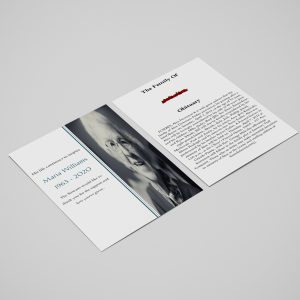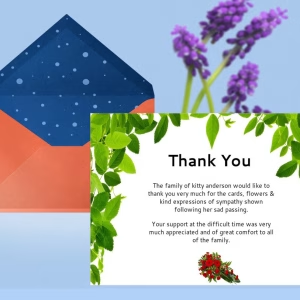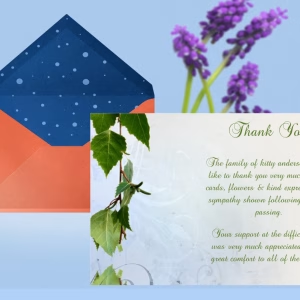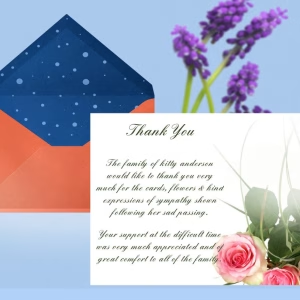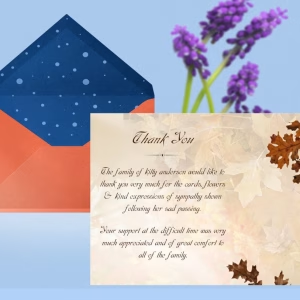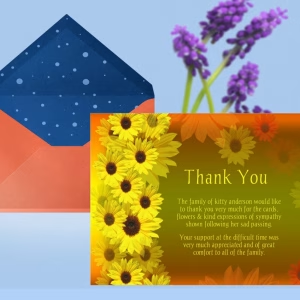Funeral thank you cards are a thoughtful way to express gratitude to those who offered support, sympathy, and condolences during a difficult time. A well-crafted message inside these cards conveys appreciation and acknowledges the kindness shown by friends, family, and loved ones. In this guide, we will explore the significance of funeral thank you cards, how to write meaningful messages, and offer some examples to inspire your own words. Whether you are creating these cards for personal use or as part of a professional service, this article will provide valuable insights into crafting heartfelt notes.
Importance of Funeral Thank You Cards
Expressing gratitude through thank you cards after a funeral serves several important purposes:
- Acknowledgment of Support: During a time of loss, the support from friends, family, and the community can be overwhelming. A thank you card acknowledges this support and lets others know their gestures were noticed and appreciated.
- Providing Closure: Writing thank you cards can be a therapeutic process for the bereaved. It allows them to reflect on the kindness they received and can provide a sense of closure.
- Strengthening Connections: Thank you cards help maintain and strengthen relationships by showing appreciation. They remind the recipients that their presence and actions were valuable during a challenging time.
- Preserving Memories: A heartfelt message in a thank you card can become a cherished keepsake for recipients, preserving the memory of the loved one and the special bond shared.
Writing Meaningful Messages Inside Funeral Thank You Cards
When crafting a message inside a funeral thank you card, it’s important to keep the tone sincere and personal. Here are some tips and examples to help you write meaningful notes:
1. Start with a Warm Greeting
Begin your message with a greeting that feels comfortable and appropriate for your relationship with the recipient. This can range from formal to casual, depending on your connection.
- Formal: “Dear Mr. and Mrs. Smith,”
- Casual: “Dear Aunt Jane and Uncle Bob,”
2. Express Gratitude
Clearly state your gratitude for the specific action or gesture the recipient offered. This might include attending the funeral, sending flowers, providing meals, or offering words of comfort.
- “Thank you so much for attending the memorial service for [Name]. Your presence meant a lot to our family.”
- “We deeply appreciate the beautiful flowers you sent in memory of [Name]. They brought us much comfort.”
3. Acknowledge the Impact
Share how the recipient’s actions positively impacted you and your family. This acknowledgment shows that their efforts were meaningful and valued.
- “Your comforting words during this difficult time were a great source of strength for us.”
- “The meals you provided helped us immensely when we couldn’t find the time or energy to cook.”
4. Include a Personal Touch
If possible, include a personal memory or sentiment that connects the recipient to your loved one. This adds a heartfelt and unique element to the message.
- “I will always cherish the stories you shared about [Name]. They brought back wonderful memories of happier times.”
- “Your friendship with [Name] was so special, and we are grateful for the love you both shared.”
5. Close with Warmth
End your message with a warm closing that suits the nature of your relationship.
- Formal: “With sincere gratitude, [Your Name]”
- Casual: “With love and thanks, [Your Name]”
Examples of Messages for Funeral Thank You Cards
Example 1: General Appreciation
“Dear [Recipient’s Name],
Thank you for your heartfelt sympathy and support during our time of loss. Your comforting words and presence at the service for [Deceased’s Name] meant so much to us. We are grateful for the love and care you have shown our family.
With sincere gratitude,
[Your Name]”
Example 2: Thank You for Flowers
“Dear [Recipient’s Name],
We are deeply touched by the beautiful flowers you sent in memory of [Deceased’s Name]. They brought a sense of peace and beauty to a very difficult day. Your kindness and thoughtfulness are greatly appreciated.
Warm regards,
[Your Name]”
Example 3: Thank You for a Meal
“Dear [Recipient’s Name],
Thank you for the delicious meal you provided for our family after the funeral. Your generosity and care helped us through a time when we couldn’t manage much on our own. We are so grateful for your support.
With heartfelt thanks,
[Your Name]”
Example 4: Thank You for Attending the Funeral
“Dear [Recipient’s Name],
Your presence at [Deceased’s Name]’s memorial service brought us comfort and reminded us of the many lives they touched. We appreciate your support and the effort you made to be with us during this time.
Sincerely,
[Your Name]”
Funeral Thank You Card
-
Searching for a Simple Funeral Thank You Card Template that is easy to print and amass and that has a cutting-edge look? This Simple Funeral Thank You Card Template is the Perfect decision that is having a measure of 8.5”x 5.5”.
- No Limitation on Content, Edit anything
- Edit anytime – unlimited revisions even after purchased
- Get printable PDF downloaded to get it printed your own.
-
Searching for a Green Leaf Thank You Card template that is easy to print and amass and that has a cutting-edge look? This Green Leaf Thank You Card Template is the Perfect decision that is having a measure of 5.5”x 8.5”.
- No Limitation on Content, Edit anything
- Edit anytime – unlimited revisions even after purchased
- Get printable PDF downloaded to get it printed your own.
-
Searching for a Natural Thank You Card Template that is easy to print and amass and that has a cutting-edge look? This Natural Thank You Card Template is the Perfect decision that is having a measure of 5.5”x 8.5”.
- No Limitation on Content, Edit anything
- Edit anytime – unlimited revisions even after purchased
- Get printable PDF downloaded to get it printed your own.
-
Searching for a Pink Rose Thank You Card Template that is easy to print and amass and that has a cutting-edge look? This Pink Rose Thank You Card Template is the Perfect decision that is having a measure of 5.5”x 8.5”.
- No Limitation on Content, Edit anything
- Edit anytime – unlimited revisions even after purchased
- Get printable PDF downloaded to get it printed your own.
-
Searching for a Autumn Thank You Card Template that is easy to print and amass and that has a cutting-edge look? This Autumn Thank You Card Template is the Perfect decision that is having a measure of 5.5”x 8.5”.
- No Limitation on Content, Edit anything
- Edit anytime – unlimited revisions even after purchased
- Get printable PDF downloaded to get it printed your own.
-
Searching for a Floral Thank You Card Template that is easy to print and amass and that has a cutting-edge look? This Floral Thank You Card Template is the Perfect decision that is having a measure of 5.5”x 8.5”.
- No Limitation on Content, Edit anything
- Edit anytime – unlimited revisions even after purchased
- Get printable PDF downloaded to get it printed your own.
-
Searching for a Irish Green Thank You Card Template that is easy to print and amass and that has a cutting-edge look? This Irish Green Thank You Card Template is the Perfect decision that is having a measure of 5.5”x 8.5”.
- No Limitation on Content, Edit anything
- Edit anytime – unlimited revisions even after purchased
- Get printable PDF downloaded to get it printed your own.
Funeral Programs : Helping Videos
Frequently Asked Question On Funeral Thank You Cards With Message Inside
When should funeral thank you cards be sent?
It is generally appropriate to send thank you cards within two to three weeks after the funeral. However, there is no strict deadline, and taking more time is acceptable if needed.
Who should receive a thank you card?
Thank you cards should be sent to anyone who attended the funeral, sent flowers, made a donation, provided meals, or offered other forms of support.
Can I personalize each thank you card?
Yes, personalizing each card with a specific mention of the recipient’s gesture or support adds a meaningful touch and shows genuine appreciation.
Is it acceptable to use pre-printed thank you cards?
Pre-printed thank you cards are convenient, but adding a personal, handwritten note inside is recommended to convey sincere gratitude.
What if I’m overwhelmed by the number of cards to send?
It’s understandable to feel overwhelmed. Prioritize sending cards to those who went above and beyond, and consider enlisting the help of family members to write and send the notes.


